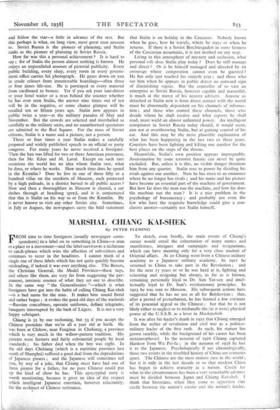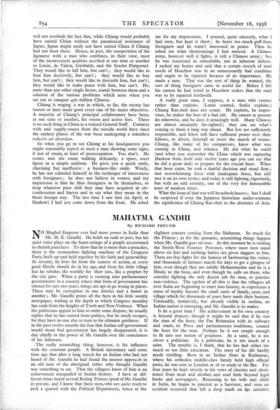MARSHAL CHIANG KAI-SHEK
By PETER FLEMING
FROM time to time foreigners (usually newspaper corre- spondents) tie a label on to something in China—a man or a place or a movement—and the label survives-gs a nickname or catch-phrase which wins the affection of sub-editors and continues to recur in the headlines. I cannot think of a single one of these labels which has not quite quickly become misleading, if indeed it was ever anything else. The Boxers, the Christian General, the Model Province—these tags, and others like them, are very far from suggesting the per- manent, intrinsic essence of what they set out to describe. In the same way " the Generalissimo "—which is what foreigners have got into the habit of calling Chiang Kai-shek —is a bad name for the man. It makes him sound florid and rather bogus ; it evokes the good old days of the warlords —Russian concubines, operatic -uniforms, defiant telegrams, banquets interrupted by the bark of Lfigers. It is not a very happy sobriquet.
Chiang is 52 by our reckoning, but 53 if you accept the Chinese postulate that we're all a year old at birth. He was born at Chikow, near Fenghua in Chekiang, a province which is very much in the willow-pattern tradition. His parents were farmers and fairly substantial people by local standards ; his father died when the boy was eight. In the old days Chekiang (which is a maritime province just south of Shanghai) suffered a good deal from the depredations of Japanese pirates ; and the Japanese will sometimes tell you, by way of a joke, that Chiang must have had one of these pirates for a father, for no pure Chinese could put up the kind of show he has. This apocryphal story is worth mentioning, because it gives an idea of the respect which intelligent Japanese entertain, however reluctantly, for the architect of Chinese resistance. To sketch, even briefly, the main events of Chiang's career would entail the exhumation of many names and manifestoes, intrigues and campaigns and resignations, which can have meaning only for a very close student of Oriental affairs. At 20 Chiang went from a Chinese military academy to a Japanese military academy. In 1911 he returned to China to take part in the Revolution ; and for the next 15 years or so he was hard at it, fighting and scheming and resigning but always, as far as is known, remaining personally loyal to Dr. Sun Yat-sen and intel- lectually loyal to Dr. Sun's revolutionary principles. In 1923 he was sent to Moscow. His subsequent actions have suggested that he has no use at all for Bolshevism ; that, after a period of perturbation, he has formed a low estimate of its potential appeal to the Chinese ; but that he is not likely either to neglect or to mishandle the (as it were) physical power of the U.S.S.R. as a lever in Machtpolitik.
It was after his leader's death in 1925 that Chiang emerged from the welter of revolution and civil war as a politico- military leader of the first rank. As such, his stature has grown steadily, while the background of his career has been metamorphosed. In the autumn of 1926 Chiang captured Hankow from Wu Pei-fu ; in the autumn of 1938 he lost it to the Japanese. Psychologically if not chronologically, those two events in the troubled history of China are centuries apart. The Chinese are the most mature race in the world ; but it is only in the last decade or so that modern China has begun to achieve maturity as a nation. Credit for what in the circumstances has been a very remarkable advance must be divided between Japan and Chiang Kai-shek. I think that historians, when they come to apportion that credit between the nation's enemy and the nation's leader, will not overlook the fact that, while Chiang would probably have united China without the paradoxical assistance of Japan, Japan might easily not have united China if Chiang had not been there. Hence, in part, the exasperation of the Japanese with a man who combines, in their view, most of the inconvenient qualities ascribed at one time or another to Lenin, de Valera, Garibaldi, and the Scarlet Pimpernel. They would like to kill him, but can't ; they would like to beat him decisively, but can't ; they would like to buy him, but can't ; they would like to discredit him, but can't ; they would like to make peace with him, but can't. He, more than any other single factor, stands between them and a solution of the various problems which arise when you set out to conquer 450 million Chinese.
Chiang is waging a war in which, so far, the enemy has sooner or later made good every one of his major objectives. A majority of Chiang's principal collaborators have been, at one time or another, his sworn and active foes. There is no such thing in China as a trained General Staff. Contacts with and supply-routes from the outside world have since the earliest phases of the war been undergoing a relentless reductio ad absurdum.
So when you go to see Chiang at his headquarters you might reasonably expect to meet a man showing some signs, if not of strain, at least of preoccupation. You don't. He comes into the room walking delicately, a spare, erect figure in a simple uniform. He gives you a quick smile, charming but =effusive : a business-like smile. Wisely, he has not schooled himself in the technique of intercourse with foreigners ; he does not believe in veneer, and my impression is that he likes foreigners to be themselves, to drop whatever poor skill they may have acquired in cir- cumlocution and finesse and to say what they mean in the blunt foreign way. The last time I saw him (in April, at Hankow) I had just come down from the front. He asked me for my impressions. I praised, quite sincerely, what I had seen, but kept it short ; he hears too much guff from foreigners and he wasn't interested in praise. Then he asked me what shortcomings I had noticed. A Chinese army, however well it fights, is still a Chinese army ; but he was interested in remediable, not in inherent defects. I racked my brains and said that a certain stretch of road north of Hsuchow was in an unnecessarily bad condition and ought to be repaired because of its importance. He made a note. That was the • sort of thing he wanted, the sort of thing foreigners came in useful for. Before I left his yamen he had wired to Hsuchow orders that the road was to be repaired forthwith.
A really great man, I suppose, is a man who creates rather than exploits. (Lenin created, Stalin exploits.) Chiang Kai-shek does not create. He exploits, he impro- vises, he makes the best of a bad job. He cannot at present do otherwise, and he does it amazingly well. Many Chinese are almost uncannily far-sighted ; they can see what's coming to them a long way ahead. But few are sufficiently responsible, and fewer still have sufficient power over their fellows, to divert, forestall or resist the march of events. Chiang, like many of his compatriots, knew what was coming to China, and whence. He did what he could (and when you remember the China which was capturing Hankow from itself only twelve years ago you can see that he did a great deal) to prepare for the crucial hour. When that hour came, he took a fearful decision and stood firm ; met overwhelming force with inadequate force, but still met it on its own terms ; and. today is still fighting, vigorously, but with an odd serenity, one of the very few honourable wars of modern times.
What the issue of that war will be nobody knows ; but I shall be surprised if even the Japanese historians under-estimate the significance of Chiang Kai-shek to the destinies of Asia.

























































 Previous page
Previous page